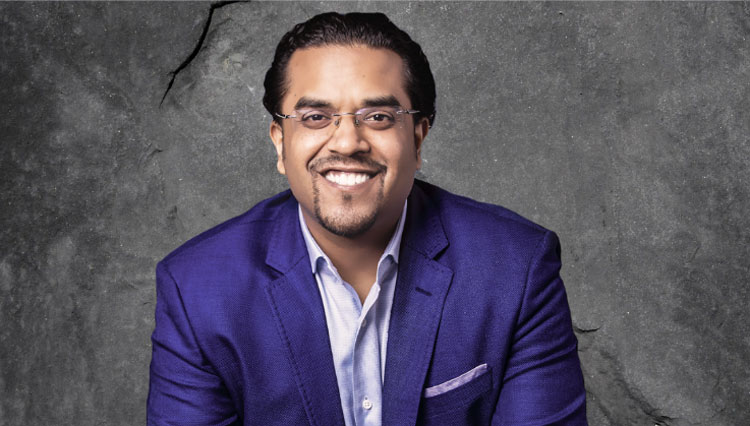Exclusive Interview with Anik Singal, CEO and Founder of online education platform Lurn

Anik Singal, CEO and Founder of the online education platform Lurn, Reviews The Changing Face of Online Education. Since the pandemic, investment in education software and online learning platforms has skyrocketed. But, in order to effectively serve this growing audience that wants to learn online, institutions need to create evergreen content that can weather our rapidly changing world. Anik Singal explores the place of online education, demonstrating how it can be a powerful tool for transformation.
Hello Mr. Singal! Thanks for taking the time to answer a few of our questions today. First up, the idea of lifelong learning, where people continue their educations throughout their entire lives, is rapidly coming into fashion. How do you see the online education industry supplementing this trend?
I’m a firm believer that learning is a lifelong pursuit. I’m now 40 years old and have been in this field for over 20 years, but I still engage with learning every single day. Learning can be as small as absorbing a new fact or starting to develop a new skill – as long as it happens every day. Online education is actively shaping this field and facilitating opportunities for people across the globe.
As we get older, we’re bogged down and interrupted by various other facets of life. Across jobs, kids, and a family, getting to classes in person would be virtually impossible. Yet, online education provides an accessible way of learning from anywhere, even if you only have a few minutes to spare.
Online courses are incredibly beneficial for two main reasons. The first of these is that they have no cost of delivery, meaning you can actively decrease the amount of money it takes to run a course. If teachers are able to reduce the cost it takes to give a class, even by a fraction, they’ll be opening up education to thousands of more people around the globe.
The second factor is that online education is instantaneous. If I want to learn a new skill, I can find an expert that’s been working in a field for 40 years in a matter of seconds. It doesn’t matter where the teacher is, as online education bridges the gap.
Online education gives us direct access to experts, anytime and anywhere. If people want to continue learning throughout their entire lives, the internet gives them the power to do so – potentially even more effectively than if they could take in-person classes.
You teach about growth scaling and digital marketing strategy. Considering how rapidly the world of digital marketing changes, how do you ensure that the courses you create are still valid in a year’s time, let alone 5+ years?
The reality is, with the speed of change in the marketing industry, nothing is going to be valid in five years. I’d hesitate to even outline teaching that people make today as being effective in a year’s time, let alone five years.
Yet, the power of online education lies in its ability to be updated and changed. If you launch a course today on Facebook Marketing, you don’t have to keep exactly the same tips and recommendations live forever. You can change out advice and update videos to align with modern practices.
Every six months in our company we run an audit of previous content that’s skill-specific. This audit allows us to then go through and update any videos that we need to, allowing our videos to move with the times. We also run these audits on our foundational models, but only around once a year. These foundational models are more about entrepreneurial skills, which don’t see as much change as digital marketing strategy.
Validity comes back to reflecting and representing what’s currently going on. You can’t build a course and expect it to be valid forever. But, you can commit to updating it to ensure it remains as accurate as possible.
Can you share any examples of surprising a surprising growth hack strategy that has worked for you in the past and yielded impressive results?
The most effective growth hack strategy we’ve used in recent years has been using affiliate marketing. Our customers monetize our course by recommending their friends, creating a chain of new customers, and ongoing personal recommendations. The world of marketing understands how powerful personalized recommendations can be, with most people tending to listen to friends and family above all else.
When launching in India, we used this factor as a primary driver of success. When people opted into our email list, they were able to Tweet or post on Facebook about it. Each user had a specific URL, which would then give them points depending on how many people signed up from their link.
We gamified this system to encourage sharing and promotion of our brand. Users could turn their points into rewards, helping to create a further incentive. This worked fantastically for us, with over 20% of all of the sign-ups coming from this strategy – well over 100,000 customers.
Alongside the growth of global online education, we’re seeing the rise of influencers in this digital space. Do you believe that influence marketing can be an effective way of promoting educational content without compromising its integrity?
The world of traditional media and celebrities is starting to fade away. In India, Web Series – TV shows that are released directly onto the web – are getting more views than major series or movies from huge production houses. Even in Hollywood, we’re seeing A-list stars opt into Netflix shows because that’s where the world is getting their media from.
In line with that, as traditional celebrities fade away, a new wave of influencers is taking their place. I believe being famous on TikTok is worth more than celebrity status. These influencers are able to actively shape trends in major industry niches. We’re seeing clothing brands, nutritional products, and makeup lines turn to influencers for their primary marketing force.
There are influencers in just about every sphere imaginable, with this now being one of the best ways of getting in touch with a new audience. As you’re able to leverage the influencer’s audience, brands can instantly build credibility and trust.
I firmly believe that influence marketing is the future.
The past decade has given rise to numerous MOOC (Massive Open Online Courses) platforms. With their rising popularity, do you see alternative education ever challenging traditional institutions?
In my opinion, online education is already directly challenging traditional educational institutions. While traditional institutions focus on holistic education, online courses typically focus on specific skills. With online education, you’re able to directly fine-tune a craft, going far beyond what typical institutions can offer.
However, one core difference is in accreditation. Even if online education can provide a better understanding of a specific skill, it still doesn’t offer an accredited diploma at the end. The world of traditional education still has this value point locked down. I expect that this will continue for the next 10 or so years. Yet, as a younger audience that has grown up with online education comes into the workforce, there will be more flexibility in this regard.
Once an HR hiring department is filled with younger people that may not have traditional educational backgrounds, everything will start to shift. When we get to that point, with accreditation not mattering as much, online education will absolutely be able to challenge the standing of traditional spaces.
Although online learning provides flexibility and accessibility, it comes with potential focus and discipline challenges for some learners. How do you see online learning catering to improve outcomes despite these challenges?
Online education has the same pitfall as buying a book. You can buy books on any topic you’d like, but that doesn’t mean you’re going to take the time to sit down and read them. I’ll be the first to say that I’ve not read even half the books in my library – it all comes back to accountability.
Online education only works when people take responsibility and actually put in the work. They fall off because they don’t have a professor creating pressure or forcing them to learn. Without discipline and accountability, people won’t get anywhere.
In the industry, I’m seeing virtual education classes start to work on cohort learning. Cohort-based education is a hybrid approach that allows people to take virtual classes but forces them to keep up with the rest of the class. A group of people will move through different modules at the same pace, creating a new way of building accountability.
This hybrid approach still offers the flexibility of online learning but starts to provide a better framework to help people stick to the classes they buy. This will go a long way for people who aren’t accountable to themselves.
How do you measure the impact of your classes on learners’ lives?
Over the past 20 years, my opinion on this has radically shifted. I once thought that it was my responsibility to create and deliver the content, but nothing else. Now, after maturing as an online educator, I believe that it’s my responsibility to ensure that people are happy and content with the knowledge I give them.
Not only does that give me a sense of satisfaction, knowing that people have taken and enjoyed my courses, but it can also help my own growth. If people enjoy a course, they’re more likely to recommend it to their friends, which comes back to the referral scheme we mentioned earlier.
I’m also seeing many online courses turn to gamification as a core way of improving the impact. Gamification can improve engagement by almost 50%, which is vital for the online education environment which is notoriously harder to stay accountable with. When combined with a community approach, where people can see your progress and celebrate that, a much more effective system is in place to keep you engaged.
As technology continues to evolve, what role do you see emerging tech like artificial intelligence and virtual reality playing in the future of online education?
Artificial intelligence is going to be enormous in the education sector. AI can actually create new curriculums and guide individual learning. Imagine a future where a student arrives at college knowing what they want to be, and AI can create a customized curriculum to lead them to that point.
In the future, AI could create custom classes, custom programs, and maybe even custom degrees for individuals. Depending on your current knowledge, expertise, and goals, you can find personalized courses that better cater to you and your learning style.
Personalization is the future of most fields, and AI is only serving to accelerate the possibilities we have to expand. AI can also directly pair with VR. Virtual reality could allow students to learn their customized curriculum while sitting in a live environment. By combining these technologies, the education sector could have a radical growth opportunity.
Simply put, I think emerging technologies are going to have a huge impact on the education sector going forward.
Have you read?
The highest-paid tech CEOs in the United States.
Highest-Paid Biopharmaceutical CEOs in the United States.
Executive Pay: Top 8 Highest-Paid Hotel CEOs.
Openly LGBTQ CEOs at the helm of major global companies.
Top countries that admire their CEOs and other C-suite leadership teams the most.
Bring the best of the CEOWORLD magazine's global journalism to audiences in the United States and around the world. - Add CEOWORLD magazine to your Google News feed.
Follow CEOWORLD magazine headlines on: Google News, LinkedIn, Twitter, and Facebook.
Copyright 2025 The CEOWORLD magazine. All rights reserved. This material (and any extract from it) must not be copied, redistributed or placed on any website, without CEOWORLD magazine' prior written consent. For media queries, please contact: info@ceoworld.biz











